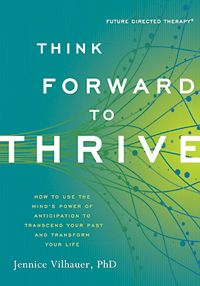Anxiety
How to Stop Re-Creating Your Past and Finally Break Free
Learn 3-steps to change the expectations you have that are keeping you trapped.
Posted June 28, 2015

Have you ever wondered why no matter what you do differently, you always seem to end up in the same place? Whether you switch jobs or move to a new city do you seem to find yourself in similar situations surrounded by similar people? No matter how many times you switch partners you always end up having the same fights? You set the same goals, then break them again and again? You don’t do this because you are masochistic or don’t truly desire change. What most people don’t realize is that they generally create their life by recreating the past over and over again because the brain works on the principle of anticipation.1
You can’t act in life without first anticipating what you are going to do. Being able to predict or anticipate the future enables us to prepare for it by taking the actions we think are necessary to meet future events with success. We make predictions about what we are expecting in life based on our past experiences and the things we’ve learned to believe are true. Our memory is what gives us the ability to store information about our past experiences so that we can use it to anticpate what will happen in the future.2 In general, the ability to predict future experiences based on what we’ve learned is a very good thing that facilitates our ability to survive the world. If a person or situation we encounter seems dangerous in someway we can remember to avoid that person or place in the future. However, if you have bad habits, self-destructive patterns, or simply a past that you would like to break free from so that you can create a better life, this system can keep you trapped unknowingly.
As things happen in life we incorporate them into our stored beliefs about our world and ourselves. For example, if you felt unpopular in high school you may have formed the belief that you are someone who is not good in social situations and feel anxious about going to social events as an adult. Every time a social event arises—the office Christmas party, a friend’s wedding, or a birthday party—you may experience a sense of anxiety or even dread just thinking about going. If that is how you feel, then in your mind you prepare for how to deal with—or better yet avoid—the uncomfortable experience. You might think about what kind of excuse you can make up to leave early or get out of going altogether. You almost certainly are not planning for how to have a great time because that is not what you are anticipating.
So let’s say a good friend invites you to her birthday party, you feel it would be worse to offend your friend than not show up, so you plan to arrive late and have prepared your excuse for leaving early if it gets too uncomfortable. You show up feeling anxious that no one will talk to you because—hey—it has happened before. You walk in quickly take a look around for a good corner to hide in and avoid eye contact with anyone as you make your way their. An hour later after wishing your friend a happy birthday and suffering through a few awkward conversations with some friendly people that approached you, you pull out your exit excuse and leave the party more convinced than ever that you are bad at social situations. The next time a social invitation comes your way, you are likely to recreate a similar scenario.
So hopefully, based on that example—even if you aren’t someone who fears social settings—you grasped the way the recreating the past experience works. Something happens, you formulate a belief about what it means, and then you use that belief to predict what is going to happen in similar future situations. You then act based on what you anticipate and end up creating the exact scenario you were expecting. This process happens in such an automatic way, most of the time you don’t have any awareness that it is even occurring. The important thing to recognize here is that the past is only relevant to the extent that you use it to make future predictions. It is your thinking about the future and what you are expecting in life that leads to your actions that create the experiences you end up living. The good news, is that once you are aware of it you can intercept this process, recognize the old beliefs and begin to generate new expectations and ways of thinking about your future, that will result in different actions.
So how do you begin? Below are 3 simple but significant steps that will help you start the change process.
1. The first step is noticing that you are expecting something negative or unwanted to occur. The way you do that is by noticing your emotions. If you are expecting something positive you will be feeing good about it, but if you are expecting something unwanted then it will be marked by a negative emotion such as anxiety, fear, dread, or hopelessness.
2. Once you notice that what you are expecting isn’t something you actually want to occur, ask yourself this very simple question: What do I want instead? This question helps you identify a different outcome to work towards. Perhaps in the above example, you would rather have an enjoyable time at the party than go there and have another bad social encounter.
3. Once you have identified what you want instead, ask yourself another important question, which is: How do I make that happen? As soon as you do this you have now engaged the problem solving part of the brain known as the executive network that can help you come up with ideas and solutions that otherwise may have never occurred to you. Perhaps you could have let your friend know ahead of time that you were feeling awkward and ask her to make some introductions, or maybe you plan out a list of conversational topics in you head so you don’t get caught off guard feeling tongue tied when someone approaches you.
As you begin to come up with a plan for how to make a situation go the way you want, what you anticipate or expect from that situation starts to change. If your expectations change so will your behavior. Any successful action you take starts to change your self-concept and more deeply held beliefs about what you can do in life. While there is a good deal more to learn on the subject of changing your expectations, if you begin with this process, take small steps, and make gradual changes, breaking out of the trap of recreating the past is possible with willingness and consistent effort.
1. Bar, Moshe. Predictions of the Brain. 2011.Oxford University Press, USA.
2. Gilbert, D & Wilson, T. Prospection: Experiencing the Future. 2007. Science, 37 (7), 1351-1354.
If you would like more practical tools for how to harness the power of anticipation and make it work for you please see —Think Forward to Thrive: How to Use the Mind’s Power of Anticipation to Transcend Your Past and Transform Your Life by Jennice Vilhauer, PhD
Dr. Vilhauer is the director of the Outpatient Psychotherapy Treatment Program at Emory Healthcare and the developer of Future Directed Therapy. www.futuredirectedtherapy.com
To view my 2015 TEDx talk on Why You Don't Get What You Want click here.





